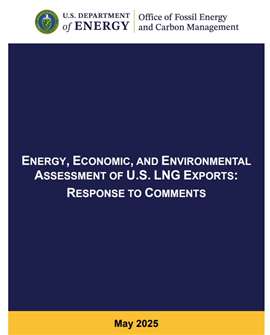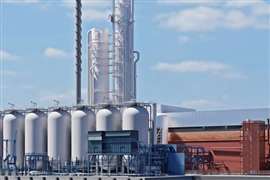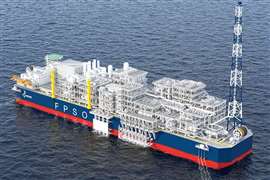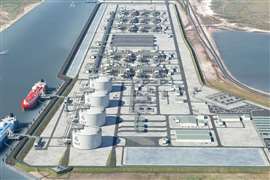DOE reaffirms support for U.S. LNG exports
May 20, 2025
Agency report: Exports ‘not inconsistent with the public interest’
The U.S. Department of Energy (DOE) concluded that U.S. liquefied natural gas (LNG) exports are not inconsistent with the public interest, despite extensive debate over environmental, economic, and geopolitical implications. The finding comes in response to more than 100,000 public comments submitted following the release of the agency’s 2024 LNG Export Study in December.
The DOE’s Response to Comments aims to clarify and address concerns raised during the public comment period and will guide future adjudications of LNG export applications to non-free trade agreement (non-FTA) countries.

Mixed reaction from industry, environmentalists, and academics
Commenters ranged from LNG developers and industrial energy consumers to environmental groups and academic researchers. Industry trade groups urged DOE to focus narrowly on energy reliability and economic benefits. Organizations like Sempra Infrastructure Partners and the Center for LNG argued that environmental and community impacts should fall outside DOE’s Natural Gas Act (NGA) purview.
Conversely, public interest organizations such as Public Citizen and the Center for Biological Diversity called on the agency to weigh climate risks more heavily, referencing executive orders that prioritize affordability and environmental safeguards.
Despite the polarized feedback, DOE reiterated that its review process incorporates multiple factors, including economic, environmental, and national security dimensions. The department will continue using scenario-based modeling without attaching probabilities to individual outcomes, citing inherent long-range uncertainties.
Study affirms modest global emissions impacts, economic gains
The 2024 LNG Export Study included analyses of global GHG emissions, domestic energy prices, and macroeconomic impacts under varying LNG export levels. DOE reported that cumulative global GHG emissions from increased U.S. LNG exports would rise by less than 0.05% through 2050, and that displacing coal or oil with U.S. gas could yield modest emissions reductions.
Domestically, the study projects natural gas prices will gradually increase but remain manageable due to supply elasticity and infrastructure investments. The analysis found no consistent historical link between LNG exports and gas price spikes.
One of the study’s central themes is the role of market forces in determining the actual volume of LNG exports. DOE stated that while the U.S. has authorized exports exceeding projected demand under most scenarios, authorization does not guarantee project success. Factors such as global energy trends, infrastructure development, and regional demand — especially from Asia and Europe — will ultimately determine export volumes.
Next steps and implications for the sector
While the DOE reaffirmed that each export authorization will continue to be evaluated individually, the tone of the response signals a measured but continued federal endorsement of LNG as part of the broader U.S. energy strategy. In its final remarks, DOE emphasized the importance of maintaining flexibility as the global energy system transitions and noted that it may update its models and assumptions again in the near future.
For U.S. LNG developers and midstream operators, the message is clear: the path to new project approvals remains open, but scrutiny will be ongoing. The agency’s acknowledgment of climate, equity, and community concerns suggests a more holistic approach to future reviews—even as it maintains that current exports provide strategic and economic value.
The report also underscores the increasing complexity facing policymakers and developers alike. As global demand for LNG grows—especially in regions seeking to displace coal—U.S. producers are balancing competitive pressures, long-term infrastructure investment, and evolving climate expectations.
Ultimately, DOE’s response leaves the door open for continued growth in U.S. LNG exports, provided projects can demonstrate both economic merit and environmental responsibility. With global energy markets shifting and long-term contracts under negotiation, the DOE’s findings will likely shape industry investment decisions well into the 2030s.
MAGAZINE
NEWSLETTER

CONNECT WITH THE TEAM










